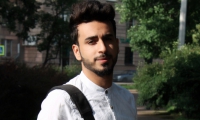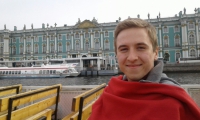Romain Darriaut, France
Master’s student, Sup’Biotech University
My major is biotechnologies. This year I had to decide where to have my research internship. I could stay in France but I preferred coming here. As for paperwork it was much easier than I thought. Thanks to International Educational Programs Department it took a couple of weeks instead of several months, such an un-Russian style! I sent my CV and a motivation letter, then I had several interviews with staff members of ITMO’s International Research Center "Biotechnologies of the Third Millennium" at which I planned to do my research.
I have been working on a project under the guidance of Denis Baranenko for over five months. I identify biological strains, make enzyme and grow tests. My task is to choose the strongest ones and inoculate them into a potato. The next step is analyzing its behavior to work on ways of how to protect seeds from fungus. Apart from ITMO’s lab I work at the Laboratory for Microbial Drug Technology — some equipment I need for my research is there. My Russian colleagues and I plan to publish the results in a scientific journal.
When I say that I am from France people start talking to me about Napoleon! I’d recommend French to work on their historical background before coming here.
Jenna Leskinen, Finland
3rd year Bachelor’s student, Lahti University of Applied Sciences, got Erasmus scholarship
When I was looking for an opportunity for academic mobility, my scientific advisor said that I could study here, as ITMO is a partner university. I really wanted to come back here — my family left Russia when I was seven and moved to Finland. I’ve also been to Moscow, so I took this offer to stay in Russia for some time.
My major is economics — here at ITMO I study the same at the Faculty of Technological Management and Innovations. All my classes are in Russian. Despite the fact that I speak this language I am not fluent. Visiting Russian language classes helps me: we study grammar and work on writing skills as well as have speaking classes. Our group is small — sometimes I am the only person who attends classes — as if I have individual training with a teacher! Financial management is the hardest discipline here. My group is quite small — about ten people. So I can address to professors if something is unclear for me. My classmates also help me a lot!
Nicolas Charlon, France
3rd year Bachelor’s student, Sup’Biotech University
I was disappointed by Russian grading system, as French is different. But now, after spending several months here I feel like everything is clear. I also got used to doing homework. The problem of learning terms in Russian is no longer challenging.
I was always interested in medicine — ITMO’s course on biomedicine gave me an opportunity to come closer to my goal. Most disciplines I had in Sup’Biotech University were about chemistry and biology.
As a person who speaks Polish I make progress in Russian mostly through cheating! It is all about similarity: when you hear a new world in Russian it may sound like a Polish one, so sometimes it is very easy to guess its definition.
Read Nicolas' story about his experience of Russia.
Olga Sabados, Germany
Master’s student, the Zittau/Görlitz University of Applied Sciences
My family is from Moldova, my parents moved to Germany when I was a child. They speak Russian, so I also speak well. That is why when my scientific supervisor at Zittau University said that she has contacts with colleagues from the Industrial Ecology Department, I didn’t hesitate and came here.
I am the first student from the Zittau/Görlitz University of Applied Sciences who has an exchange semester at ITMO. In Germany I studied integrated management. Here I have four disciplines and an internship — it is at the Coca Cola factory. Together with other students I work on a so-called stakeholder analysis, which helps manufacturing companies develop requirements and standards for organizations that affect or are affected by these companies.
Being a student who graduated from high school and received a Bachelor degree in German, I was surprised by some peculiarities of the Russian educational system. For instance, I had no idea what "metodichka" is [It is a student guideline with instructions of how to prepare for tests and do home tasks -Ed.]. In Germany we had large studying groups, about 200−300 people, here I study together with a dozen students or less. Lecturers know us personally, even our names! It makes student-teacher interaction more personal — sometimes it’s good but it also may provoke favoritism. However my experience was completely positive — both lecturers and students helped me to adjust.



